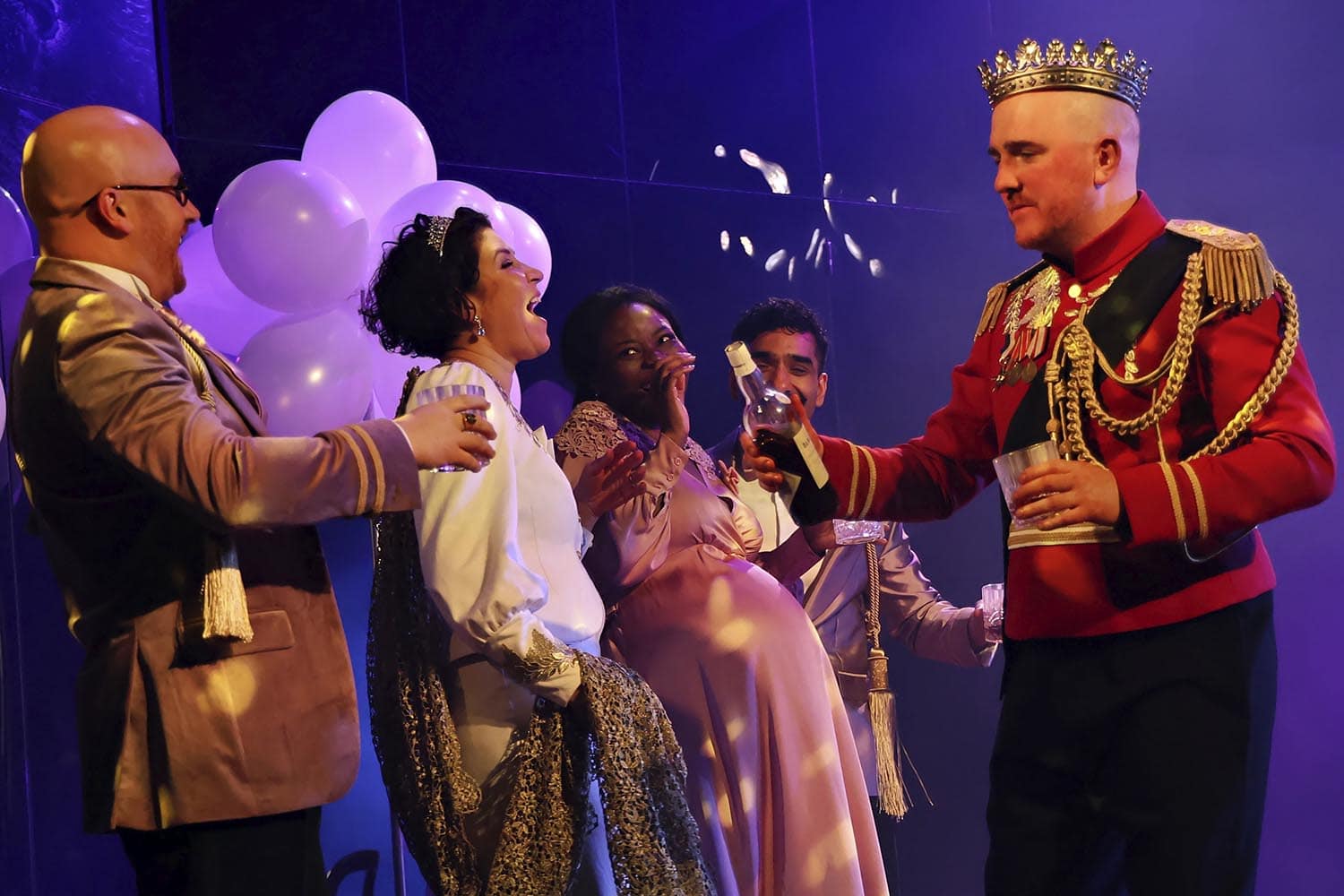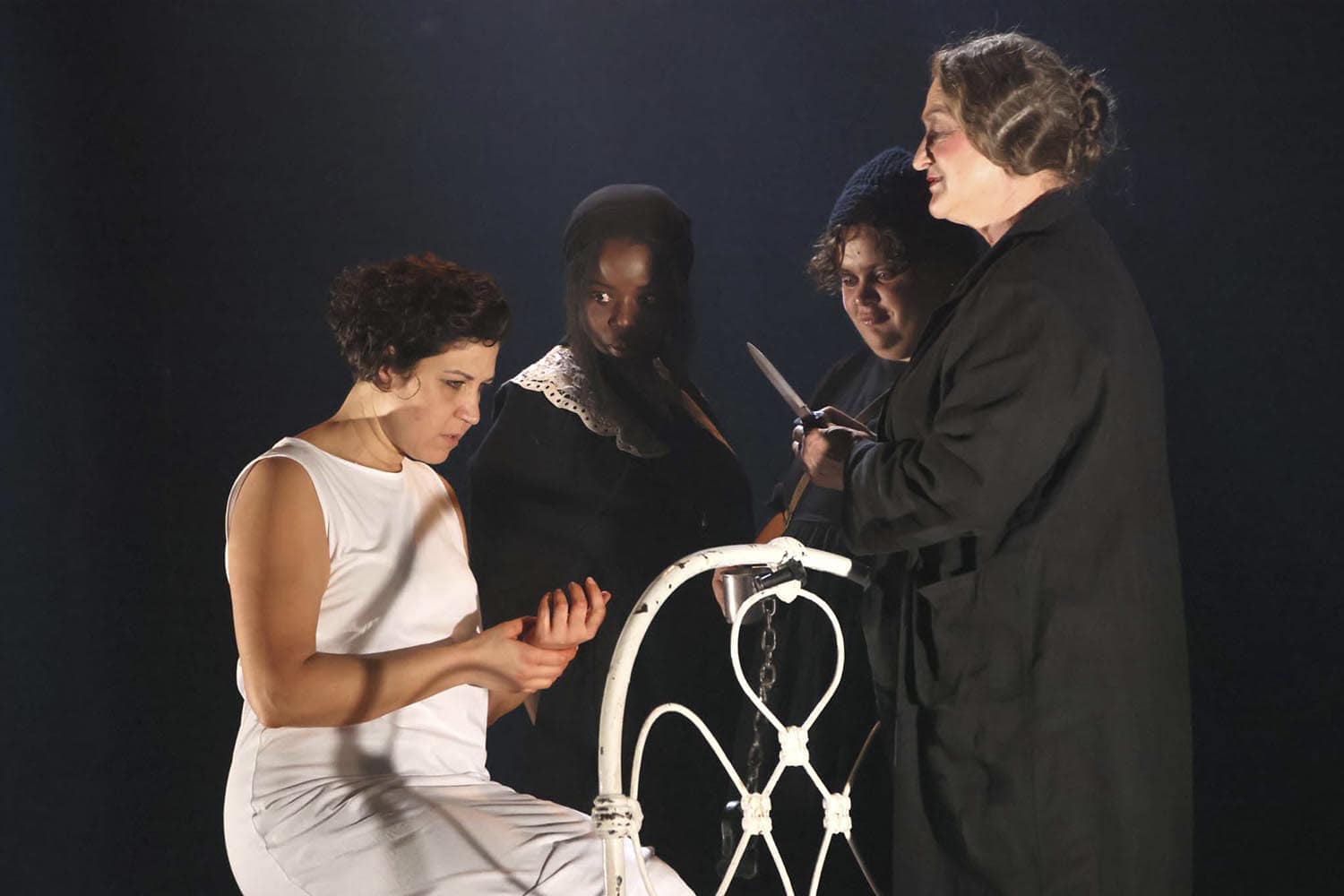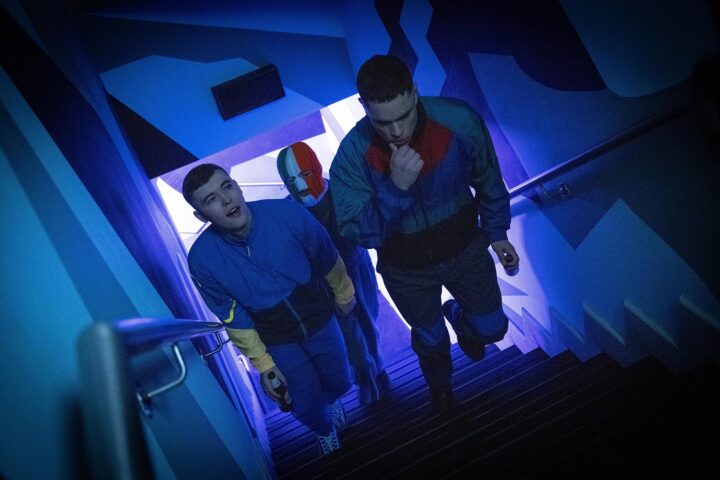And nobody in all of Scotland is ever gonna bring her down. That’s the thesis, more or less, of Macbeth (An Undoing), a production from the Royal Lyceum Theatre Edinburgh now at Brooklyn’s Theater for a New Audience, that strives to do for Lady Macbeth (Nicole Cooper) what Wicked did for the Wicked Witch of the West. (There’s even a backstory involving a sisterly Good Witch, Emmanuella Cole’s wronged Lady Macduff.) But Zinnie Harris’s play never defies gravity in its laborious quest to reimagine and center Lady Macbeth’s story.
Perhaps Harris hasn’t seen a decent production of Shakespeare’s Macbeth. The smart ones articulate without textual revision what Macbeth (An Undoing) goes to such unsubtle lengths to declaim: Lady Macbeth is the more powerful, ingenious, compelling character, and it’s her coolly competent ambition, not her husband’s, that motors this play. No argument there.
What especially bothers Harris isn’t the ferocity but the fragility in the original Lady Macbeth’s villainy, the way the character recedes from Shakespeare’s play, her final sleepwalking scene offering only a shadow of the calculating, cruelly deliberate woman who dominates the action of Macbeth’s first half. How could such a seismic force go out with a whimper? Maybe a fragment of the play is missing, this update proposes and then enacts, in scene after scene, as Lady Macbeth conquers the word count and then, eventually, the country.
Sure, Harris is correct that Shakespeare won’t let Lady Macbeth relish her power, but he doesn’t let Macbeth enjoy his either: That, to sum up centuries of scholarship, is what the whole play is about. Macbeth’s guilt-fueled madness actually overtakes him before Lady Macbeth’s does; by the coronation banquet, he’s already haunted by the spirit of one of his victims. In this new celebration of sorts of Lady Macbeth’s unchecked fury, Shakespeare’s intended warning about the cost of both Macbeths’ violent self-advancement somehow goes ignored.
Think what you will of Shakespeare’s Macbeth, it’s an indisputably efficient play, and it hurtles through the Macbeths’ rise and fall with terrifying momentum. By challenging the play’s gender imbalance, Harris also saps it of its energy by adding too many scenes, like redundant confrontations between the Macbeths in the leadup to, and fallout from, their murder of King Duncan. (She also shoehorns in an unexpected adultery plotline for Banquo and Lady Macduff.)

Macbeth (An Undoing) clings close structurally to Shakespeare’s play itself, and the text seems an even split between Harris and Shakespeare. As a result, the imaginative possibilities of crafting a richer backstory for Lady Macbeth—such as giving us a sense of who this woman was before her marriage—are largely constrained by the original work’s borders.
Harris mainly makes her points through metatheatrically contrived jabs at Shakespeare’s text. (“This is not the script!” Lady Macbeth keeps crying out.) Some of these moments are fun, like occasional winking audience addresses from one of the Weird Sisters (a wryly coarse Liz Kettle), but too often the production subsumes its theatrical playfulness in a duller self-seriousness, including a final scene in which the deceased Lady Macbeth bonds with a murdered messenger muttering lines from A Midsummer Night’s Dream in heaven? Hell? Brooklyn?
There’s a sense that Harris, who also directed the play, is most invested in her invented scenes, with the lengthy chunks of the original text often feeling like something to get through en route to the next textual twist. That, in some ways, is the work’s biggest disappointment, since Cooper’s Lady Macbeth and Adam Best’s Macbeth have a tensely combustible chemistry that might propel a traditional production but never fully plays out here. Even as the play’s machinery grates, Cooper remains a strikingly dynamic presence, nimbly toggling between iambic pentameter and Harris’s contemporary speeches. And the design—especially Tom Piper’s eerily mirrored set and Alex Berry’s 1930s wardrobe—is refreshingly precise and evocative.
Harris’s play rests, ultimately, on the overly complicated claim that Shakespeare dehumanized Lady Macbeth by humanizing her too much, her eventual repentance an indication of his lack of faith in lasting female fierceness. “They were right when they said the play is cursed, I understand that now,” Lady Macbeth over-articulates at one point. “As long as they want blood and the madness of women, we are here to give it to them…I know I don’t kill myself, would never.” In all the sound and fury of undoing a play that seems here more sinned against than sinning, Lady Macbeth gets tangled in her own unraveling.
Macbeth (An Undoing) is now running at Theater for a New Audience.
Since 2001, we've brought you uncompromising, candid takes on the world of film, music, television, video games, theater, and more. Independently owned and operated publications like Slant have been hit hard in recent years, but we’re committed to keeping our content free and accessible—meaning no paywalls or fees.
If you like what we do, please consider subscribing to our Patreon or making a donation.





